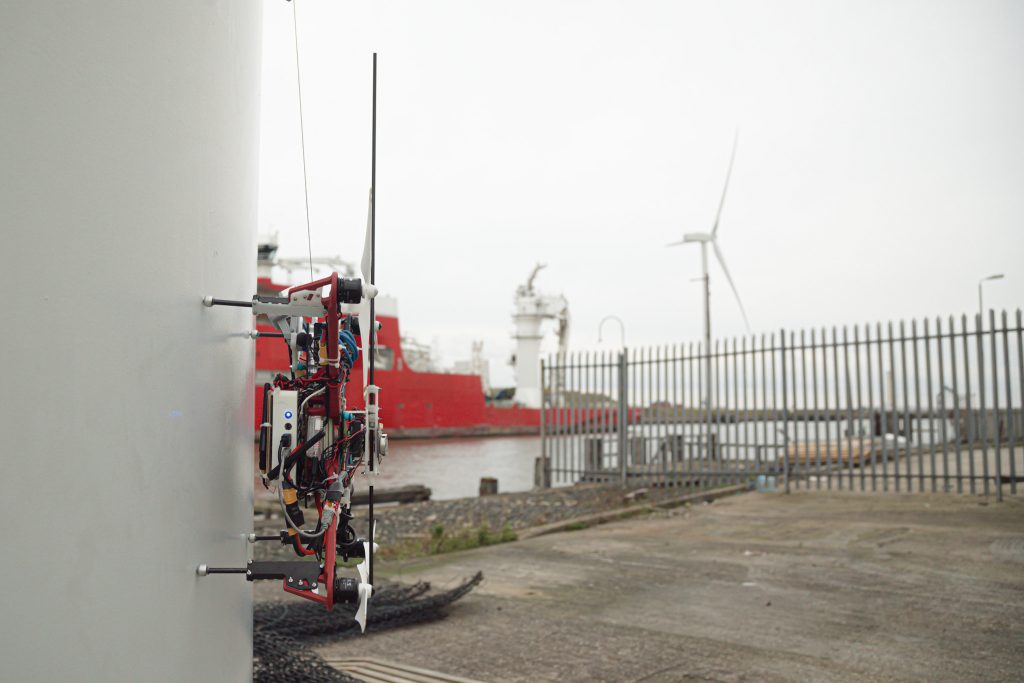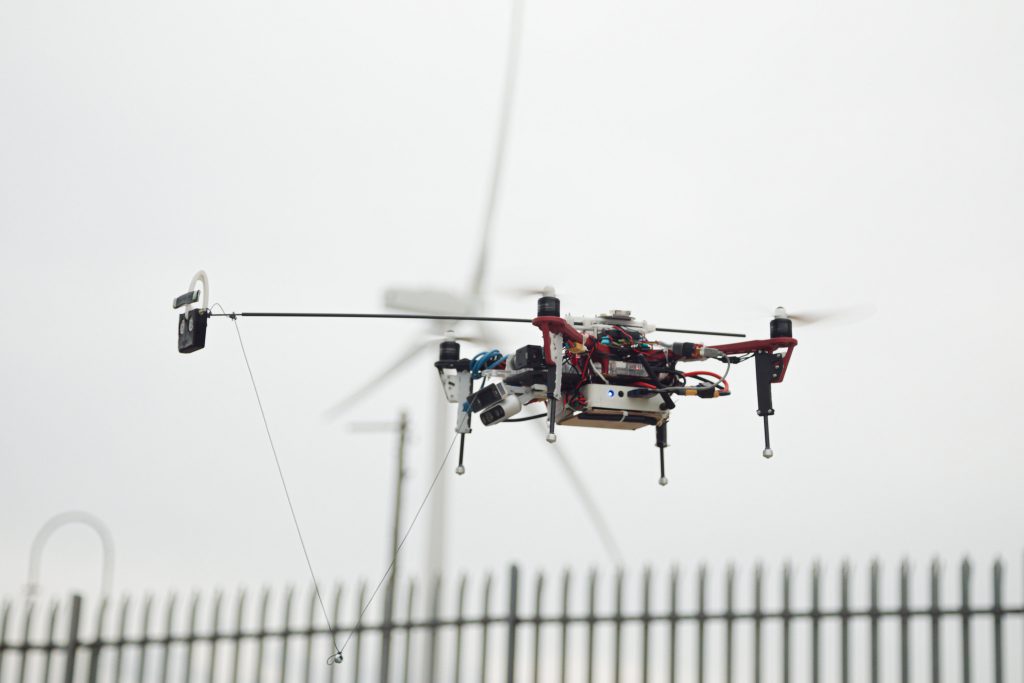The ORCA Hub secures £2.5m of further funding to expand robotics research into new sectors

The ORCA Hub secures £2.5m of further funding to expand robotics research into new sectors

Using robots to make offshore infrastructure inspection and repair safer is moving a step closer following the injection of £2.5 million of further funding from UK Research & Innovation (UKRI).
Founded in 2017 and led by Heriot-Watt and the University of Edinburgh, the ORCA Hub [1] which includes Imperial College London, Liverpool and Oxford Universities, is supporting energy transition and the growth of renewable energy. It is one of the strategic projects within the National Robotarium.
Working with industry partners, the Hub’s aim is to help the offshore energy industry to use robots to safely inspect, maintain and repair platforms, wind turbines, and other infrastructure, guided by human experts on ships or back on shore.
£600,000 of the new funding will be used to help deliver six demonstration projects with industrial partners, including the inspection of wind turbine foundations and the deployment of Industrial Internet of Things (IIoT) sensors.
The remaining £1.9 million will fund an extension of ORCA Hub’s activities to see if technologies and processes developed by the Hub can be used in other sectors, ranging from construction and urban infrastructure through to decommissioning and waste management.
Yvan Petillot, professor of robotics and autonomous systems at Heriot-Watt University and co-academic lead of the National Robotarium, has been appointed as the ORCA Hub’s new director.
He takes over from Professor David Lane, founding director of the Edinburgh Centre for Robotics, who will continue to support the Hub as an advisor to its independent steering committee.
Professor Petillot said: “Robots have the potential to carry out inspection and maintenance in hazardous environments, reducing the risks of putting divers into the water in harsh conditions or workers operating at height on wind turbines. Finding ways to combine the flexibility of autonomous robots with remote human operators has been one of the key strands in my career over the past 20 years.
“The international offshore energy industry is undergoing a revolution, adopting aggressive net-zero objectives, and shifting rapidly towards large scale offshore wind energy production.
“The long-term industry vision is for a digitised offshore energy field, operated, inspected and maintained from the shore using robots, digital architectures and cloud-based processes to realise this vision. However, the recent pandemic has highlighted a widespread need for remote operations in many other industrial sectors.
“The ORCA Hub has built a community of roboticists and expertise during its initial phase. This funding extension aims to accelerate the translation of the research into our existing industry network, working with companies including Wood, EDF and Ross Robotics, while expanding into new sectors by adapting the current research and tackling the novel challenges these sectors bring.�
During its first project for the ORCA Hub, the Spot robot will be deployed on construction sites, collecting data and measurements in real time. This will allow multiple parties, regardless of location to access and review the data, building greater understanding of the construction process and allowing companies to identify new efficiencies, potential hazards and quality control measures.

UK Government Minister for Scotland Iain Stewart said: “Advancements in robotics will be essential to meeting the UK’s ambitious climate targets.
“Robots can help us to reduce waste, safely manage new infrastructure such as solar energy and offshore wind, and better monitor and protect our environment.
“The UK Government is building back better from the pandemic, supporting cutting-edge research across the entire UK and investing £21 million in the National Robotarium as part of the Edinburgh and South East Scotland City Region Deal.”
Professor David Lane added: “Since the ORCA Hub was launched, its successes have been wide ranging from launching tech that can help humans and robots to speak the same language to autonomous drones that can inspect offshore turbines.
“However, research of this type can only have impact if it is driven by and addresses specific industry needs. Significant industry engagement has been achieved since 2017 with 68 individual research projects, PhD sponsorships, user engagements, and supply of equipment, hardware, software, data and asset samples taking place with a further 16 projects currently in discussion or pending approval with an estimated value of over £6M. We’ve spun-out a company and two more are in the process of spin-out, alongside two patent applications enabling developments to be licensed to companies.�
Engaging with the public has also been an important objective with events reaching over 15,000 members of the public.
Simon Reeve, chair of the ORCA Hub’s Independent Steering Committee, said “The Hub’s success to date has been greatly helped by the contributions of a wide range of specialists overseeing its strategic direction. An international scientific panel supported the early stages of the Hub, while an industry panel reviews and guides the application of the new technologies. Our Independent Steering Committee is made up of international specialists representing government, public and private sector organisations across a wide range of sectors providing fresh perspective and the best possible support to achieving the Hub’s objectives.�
Andrew Tyrer, Challenge Director – Robotics, Industrial Strategy Research Fund, said: “The funding is crucial to widening the scope of our work. With net-zero ambitions underlying industrial plans in every sector, and the chance to rebuild new industries after the pandemic, robotics, AI and automation are vital ingredients for the future.�
The National Robotarium is funded separately from the ORCA Hub. The National Robotarium is supported by £21 million from the UK Government and £1.4 million from the Scottish Government as part of the £1.3 billion Edinburgh and South East Scotland City Region Deal – a 15 year investment programme jointly funded by both governments and regional partners.
A series of webinars exploring the work of the National Robotarium launches on 17 June 10.30-11.30. The National Robotarium presents…opens with The ORCA Hub & the future of offshore energy, examining how robotics and technologies can be utilised offshore and in other industries. https://bit.ly/2TbeKBB.
The National Robotarium building will open on Heriot-Watt’s Edinburgh campus in 2022.Â
The National Robotarium is a partnership between Heriot-Watt University and the University of Edinburgh, which combines Heriot-Watt’s engineering heritage and strengths in robotics for hazardous environments, manufacturing, healthcare, and human-robot interaction with the University of Edinburgh’s expertise in space, construction, and humanoid robotics.
Funded by the Edinburgh & South East Scotland City Region Deal, the National Robotarium supports the deal’s overarching objective of accelerating growth by attracting inward investment and talent.
Follow @NRobotarium or find us on LinkedIn https://www.hw.ac.uk/uk/research/the-national-robotarium.htm    UK Research and Innovation (UKRI) is the largest public funder of research and innovation in the UK, with a budget of around £8bn. It is composed of seven disciplinary research councils, Innovate UK and Research England.Â
We operate across the whole country and work with our many partners in higher education, research organisations businesses, government, and charities.
Our vision is for an outstanding research and innovation system in the UK that gives everyone the opportunity to contribute and to benefit, enriching lives locally, nationally and internationally.
Our mission is to convene, catalyse and invest in close collaboration with others to build a thriving, inclusive research and innovation system that connects discovery to prosperity and public good.
www.ukri.org Â
Comments are closed